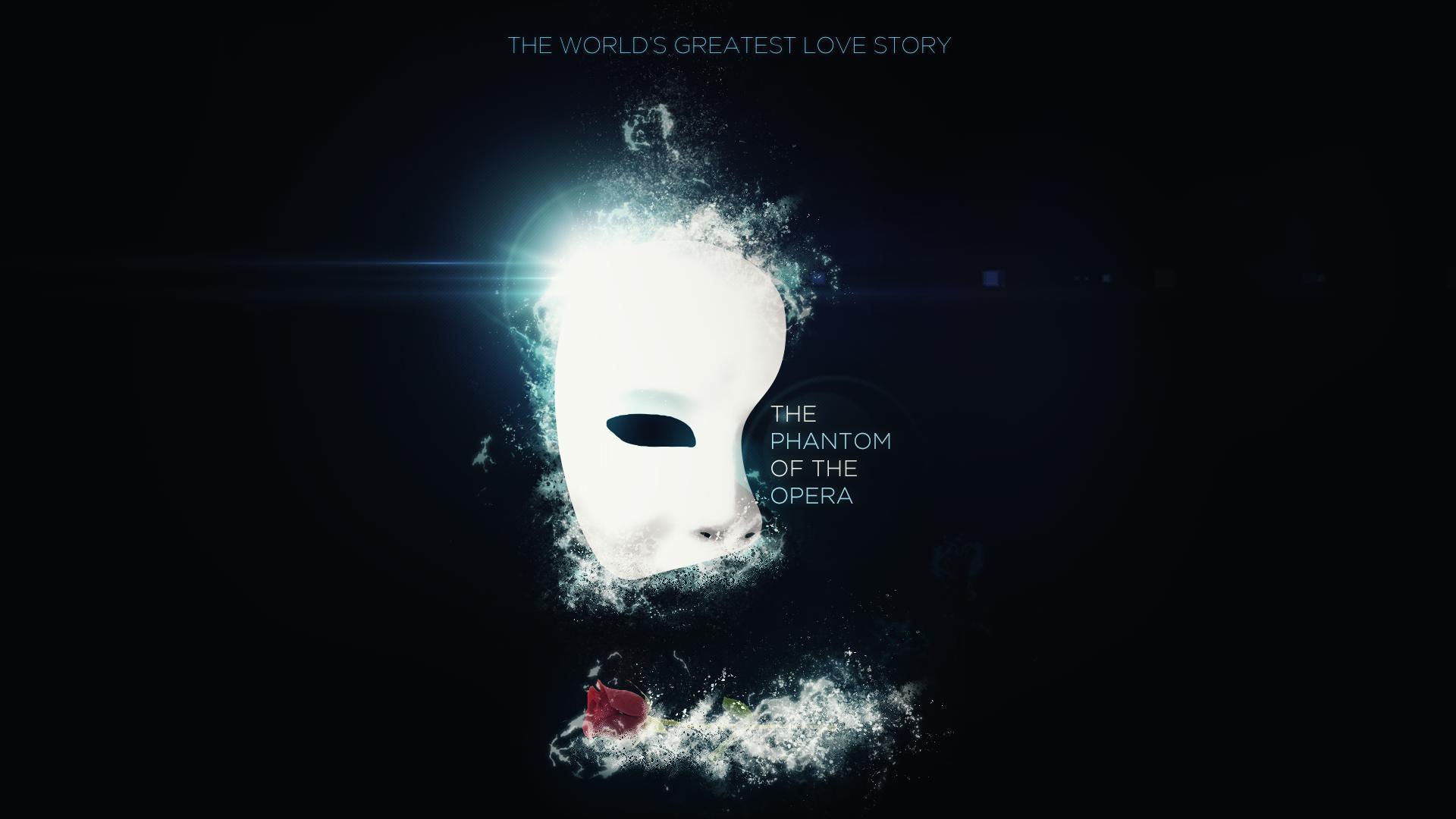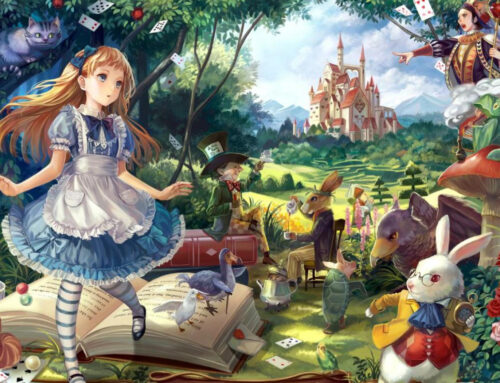“Masquerade… paper faces on parade. Masquerade! Hide your face so the world will never find you!
When the 1986 Broadway production of the Phantom of the Opera‘s soundtrack was released in South Africa in 1989, we started listening to it non-stop. The beautiful voices of Michael Crawford and Sarah Brightman took us on a journey of music, love and loss. When I was growing up there was no Google or easy access to overseas products.
Check out our Phantom of the Opera inspired art for sale on Red Bubble!
We had to figure out the story for ourselves. I found myself obsessed with the Phantom – the sad and tragic story of his birth and tried to get my hands on anything relating to the Phantom. I even watched a documentary on the Paris Opera House, starring David Copperfield. So here are my top 8 Phantom of the Opera books, TV documentaries and DVD’s:
# 8: Movie: The Phantom of the Opera (2004) {with Gerard Butler}
This adaptation of “The Phantom of the Opera” closely follows the Broadway production. The 2004 British film, based on Andrew Lloyd Webber’s 1986 musical and Gaston Leroux’s French novel “Le Fantôme de l’Opéra,” tells the story of a disfigured musical genius living beneath the Paris Opéra House, whose obsession with a young soprano unfolds. However, I must admit, the main reason I didn’t entirely love this movie was the casting of actors who, while commendable in their efforts, weren’t strong singers. In my mind, the Phantom’s character demands an almost hauntingly angelic voice, a quality that Christine’s character mirrors in the story. Unfortunately, well-known actors Gerard Butler and Emmy Rossum, though they tried their best, lacked the vocal prowess required for these roles. On a positive note, one element I did appreciate in the film was the addition of Andrew Lloyd Webber’s new song, “No One Would Listen.” It’s a gorgeous and deeply touching addition to the story.
# 7: Book: Le Fantôme de l’Opéra by Gaston Leroux (first released in 1909)
Without Gaston Leroux’s original version of ‘Le Fantôme de l’Opéra,’ we might not have ‘The Phantom of the Opera’ as we know it today. The novel draws inspiration from both historical events at the Paris Opera during the nineteenth century and an apocryphal tale involving the use of a former ballet pupil’s skeleton in Hector Berlioz’s 1841 production of ‘Der Freischütz.’ When I delved into the novel, I found it to be a challenging read, almost like a historical documentation of facts. However, amidst its complexity, there were truly beautiful moments that stood out. One of my favourite excerpts from the novel is: ‘If I am the phantom, it is because man’s hatred has made me so. If I am to be saved, it is because your love redeems me.’
# 6: TV Documentary: The secret of the Phantom of the Opera – David Copperfield (1991)
I am a huge fan of David Copperfield, and in 1991 we had the opportunity to see David Copperfield visit the Paris Opera house with the educational, semi-documentary The Secret of the Phantom of the Opera.
What truly captivated me was how this production made references to excerpts from ‘The Complete Phantom of the Opera,’ bringing to life the catacombs, dressing rooms, theater, and all the iconic elements associated with the Phantom of the Opera that I had previously only encountered in literature.
“Poor, unhappy Erik! Shall we pity him? Shall we curse him? He asked only to be ‘someone,’ like everybody else. But he was too ugly! And he had to hide his genius or use it to play tricks with, when, with an ordinary face, he would have been one of the most distinguished of mankind! He had a heart that could have held the entire empire of the world; and, in the end, he had to content himself with a cellar. Ah, yes, we must need pity the Opera ghost…”
# 5: Movie: The Phantom of the Opera (1990) {with Charles Dance}
This particular rendition of “The Phantom of the Opera” holds a special place for me as it was one of the earliest adaptations I had the pleasure of watching. In this version, the role of The Phantom of the Opera, portrayed by Charles Dance, depicts Erik, a disfigured musician who resides beneath the grand Opéra Garnier in Paris. He plays a pivotal role in overseeing each performance with the assistance of his friend, Gerard Carriere, played by Burt Lancaster. However, his life takes a dramatic turn when Carriere is dismissed, and the opera appoints a new manager, Choleti.
Choleti’s wife, Carlotta, is a haughty and ill-tempered diva with a voice to match her unpleasant personality. Into this theatrical world steps Christine Daae, played by Teri Polo, in search of voice lessons promised to her by Phillipe, the Comte de Chagny. She soon discovers that she is not the first beautiful face brought to the opera by Phillipe. Initially dismissed by Carlotta, Christine is given an opportunity to work in the costume department after it’s revealed that she has a powerful patron. With no home or money, Christine finds refuge in a storage room within the Opera House.
One night, Christine ventures onto the stage and sings to an empty theater, instantly captivating the Phantom with her enchanting voice. When she inquires about the Comte de Chagny, the Phantom offers a poignant observation: “He is unworthy of you. He comes to the Opera for the wrong reasons… he comes for the beauty of faces rather than the beauty of music.”
What truly endeared me to this version of the story was its enchanting music. Despite being a TV drama, the Phantom’s voice was genuinely mesmerizing, and the beautiful duets between the Phantom and Christine conveyed a deep and authentic connection. The unconventional ending set it apart from other adaptations, and to this day, I hold a special affection for this particular rendition.
# 4: Movie: Love Never Dies – London Production
I understand that many die-hard fans of “The Phantom of the Opera” were apprehensive about its sequel, but in this case, I must commend Andrew Lloyd Webber. The music in the sequel is truly remarkable, evoking deep emotions and narrating a poignant and heart-wrenching tale. This story follows Erik, under a different identity, as he relocates to the lively amusement resort in Coney Island, where he extends an invitation to the renowned soprano Christine Daaé to perform once more. Little does she, her husband Raoul, and their child Gustave know what awaits them.
“Love Never Dies” is adorned with a collection of exquisite songs, including “Till I Hear You Sing,” “Beneath A Moonless Sky,” and the well-known “Love Never Dies.” If you happen to be a devoted Phantom fan, I wholeheartedly recommend giving this sequel a watch; its music and storyline are sure to captivate you.
# 3: Movie: The Phantom of the Opera at the Royal Albert Hall (2011)
I’ve had the privilege of witnessing “The Phantom of the Opera” on stage not once, but twice, with a cast personally approved by Andrew Lloyd Webber himself. It was an absolutely incredible experience. I can confidently say that if you’re eager to experience the magic of this production, watching the movie adaptation is a remarkable alternative, capturing much of the live production’s essence.
The narrative unfolds around a disfigured musical genius concealed within the opulent Paris Opera House. He instills terror within the opera company, all for the unwitting benefit of a young protégée whom he both mentors and deeply loves. The music in this production is nothing short of breathtaking, making it an absolute must-watch for anyone seeking a mesmerizing and unforgettable theatrical experience.
# 2: Book: The Complete Phantom of the Opera (George Perry) (1988)
You might find it unusual that I’ve ranked “The Complete Phantom of the Opera” as my second favourite, but it’s essential to consider that during my formative years, this book served as my go-to source of information. It’s a truly delightful book, brimming with a treasure trove of images, captivating stories, and even the original libretto from the 1986 cast. What’s particularly fascinating is a section of the book that meticulously details the step-by-step transformation of Michael Crawford into the iconic Phantom of the Opera.
Described aptly by Amazon.com, this book serves as the lavishly illustrated, definitive account of the Phantom legend. It traces the origins of the Phantom myth from its historical roots to Gaston Leroux’s poignant classic novel and explores its various artistic interpretations right up to the present day, encompassing Andrew Lloyd Webber’s resoundingly successful musical. Without a doubt, it’s a must-have for Phantom enthusiasts and anyone intrigued by the Phantom’s enduring legacy.
# 1: Book: Phantom – Susan Kay (released: 1990)
I’ve lost count of the number of times I’ve delved into the pages of this book, which spans an impressive 532 pages. Susan Kay accomplishes something that only a select few authors have managed with the tragic tale of the Phantom of the Opera – she breathes life and depth into Erik, the enigmatic Phantom. While the story draws loose inspiration from Gaston Leroux’s classic “The Phantom of the Opera,” it delves far deeper into the character’s psyche.
In this book, the Phantom is born as Erik in Boscherville, a small town not far from Rouen, in the summer of 1831. His father, a renowned stonemason, tragically perishes in a construction accident just months before Erik’s birth. His mother, a beautiful but spoiled and vain woman, is the daughter of an Englishwoman and a French architect. She is incapable of embracing her deformed child and even shuns the idea of naming or touching him. Instead, she directs the elderly priest who baptizes him to bestow the child with his own name. Driven by his mother’s shame and concerns for his safety, Erik is compelled to endure his childhood confined within the walls of his home, always concealed behind a mask.
The narrative takes us on an extraordinary journey alongside Erik, allowing us to intimately experience his anguish, his first taste of love followed by heart-wrenching loss, his friendship with a benevolent architectural professor, his time in the Persian court, his enduring companionship with the Persian himself, and his fateful residency within the Paris Opera House. In the early pages of the book, Erik reflects on his unique talents, stating, “I can make anything disappear if I truly desire, anything except my face.”
I hesitate to divulge any more details; suffice it to say that this book is unquestionably my all-time favorite. It is a literary masterpiece that deserves to be read by all.
“You alone can make my song take flight. Help me make the music of the night…”























